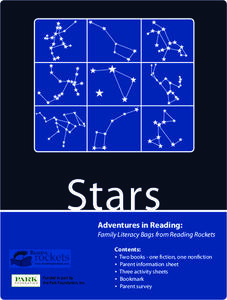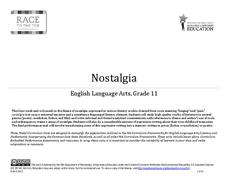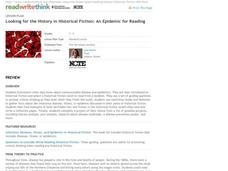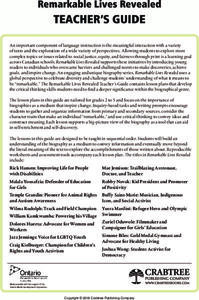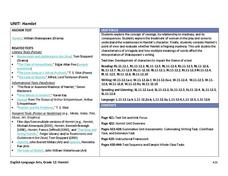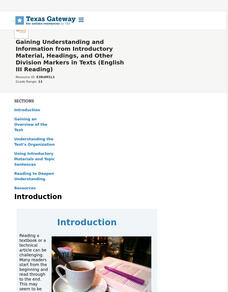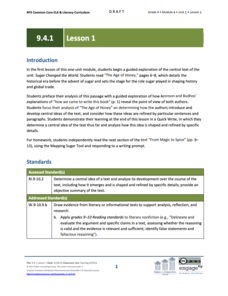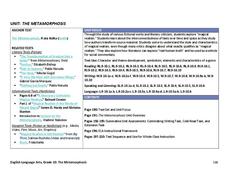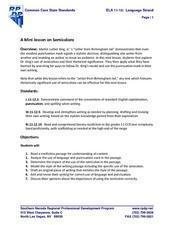PBS
Reading Adventure Pack: Rocks
A Reading Adventure Pack focuses on rocks. Scholars participate in three activities after reading a fiction and nonfiction text—The Jade Stone, a Chinese folktale adapted by Caryn Yacowitz, and Rocks in His Head by Carol Otis Hurst....
PBS
Reading Adventure Pack: Folktales
Following a reading and thorough discussion of books—Anansi the Spider: A Tale from the Ashanti by Gerald McDermott and The Moon Book by Gail Gibbons—scholars complete three activities. First, they use playdough or cookie dough to create...
PBS
Reading Adventure Pack: Stars
A Reading Adventure Pack explores the night sky. Reading Her Seven Brothers by Paul Goble and Find the Constellations by H.A. Rey begin the learning experience. Scholars craft a night sky mobile, go stargazing, and write a mythical story...
Houghton Mifflin Harcourt
Around Town: Neighborhood and Community: English Language Development Lessons (Theme 3)
Here is a unit designed to support English language development. Scholars speak, move, and write to learn more about topics that focus on community and local concepts. The series of lessons aids to reinforce concepts including consonant...
Scholastic
Pilgrim and Wampanoag Daily Life
A instructional activity looks at the Pilgrims and Wampanoag tribe during the first Thanksgiving. Scholars compare and contrast information presented by an online activity then discuss their findings. Learners examine the two group's...
K12 Reader
Uncle Tom’s Cabin: George’s Speech
Sometimes it takes a work of fiction to demonstrate nonfictional tragedies and events. George, an escaped slave, describes to Mr. Wilson the hardships of his life in a short passage from Harriet Beecher Stowe's novel, Uncle Tom's Cabin.
EngageNY
Grade 9 ELA Module 1, Unit 1, Lesson 5
Finding the central idea in a text is equally important in fiction and nonfiction. Work on analyzing a piece of writing for the central idea with Karen Russell's "St. Lucy's Home for Girls Raised by Wolves," complete with supporting...
Massachusetts Department of Education
Nostalgia
To prepare for crafting their own memoir, class members examine poetry by Margaret Atwood, Billy Collins, Robert Hayden, and Claude McKay, stories by Richard Rodriquez and Willa Cather, and Barry Levinson's film Avalon. They examine how...
ReadWriteThink
Looking for the History in Historical Fiction: An Epidemic for Reading
Combine informational reading skills with fictional text in an innovative historical fiction lessons. After reading a fictional text related to diseases, class members read non-fictional text to gain knowledge about specific infectious...
Crabtree Publishing
Remarkable Lives Revealed
Six lessons make up a unit all about biographies. Scholars read about a remarkable life while taking notes and identifying characteristics of the biographical genre. Readers examine the tale's obstacles, accomplishments, and sequence of...
Louisiana Department of Education
Unit: Hamlet
Encourage readers to determine if Hamlet's madness is actually divinest sense. Class members analyze the words of the play before studying related texts, including T.S. Eliot's "The Love Song of J. Alfred Prufrock," scenes from...
Core Knowledge Foundation
Greek And Latin Root Words
Students examine Greek and Latin root words. They research the history of the English language, solve word games and puzzles, write paragraphs about the impact of Greek and Latin on the English language, and create flip chart study guides.
EngageNY
Adding to Cascading Consequences and Stakeholders: Hunter-Gatherer Food Chain
Could the hunter-gatherer food chain feed everyone in the United States? To consider the question, pupils use their research and add to the Cascading Consequences chart based on Michael Pollan's hunter-gatherer food chain from The...
Texas Education Agency (TEA)
Gaining Understanding and Information from Introductory Material, Headings, and Other Division Markers in Texts (English III Reading)
All teachers are teachers of reading! The 13-part interactive series ends with a lesson that teaches learners (and their instructors) how to approach reading their textbooks. After learning about several strategies, users test their...
PBS
Arthur’s World Neighborhood: Bibliography for Kids
Support young learners as they expand their cultural awareness with this list of children's literature on countries from around the globe. Including both fictional and non-fictional texts. This resource will help students across the...
PBS
The Diary of Anne Frank
While designed to supplement a viewing of the PBS Masterpiece Classic The Diary of Anne Frank, this resource can also serve as an excellent informational text and activity source for your students on the historical context and timeline...
EngageNY
Grade 9 ELA Module 4, Unit 1, Lesson 1
How do writers introduce and develop the central ideas in a text? To answer this question, ninth graders closely examine "The Age of Honey," the opening chapter in Marc Aronson and Marina Budhos' Sugar Changed the World: A Story of...
EngageNY
Local Sustainable Food Chain: Determining Cascading Consequences Using The Omnivore’s Dilemma
What are the consequences of the local, sustainable food chain? Research teams explore the question as they review Michael Pollan's The Omnivore's Dilemma. The teams complete Cascading Consequences charts and then choose research topics...
Louisiana Department of Education
Fahrenheit 451
In his 2013 introduction to Fahrenheit 451, Neil Gaiman states, “Fiction is a lie that tells us true things, over and over.” In this extraordinary unit plan, readers "explore the power of written language to educate and influence...
Louisiana Department of Education
The Metamorphosis
How can something be true even if it didn't happen? Invite your classes to investigate the truths found in the world of magical realism as they analyze short stories, poems, informational texts, video, and art from this genre.
Curated OER
Basil Heatter, "The Long Night of the Little Boats"
“It was a miracle.” Basil Heatter’s “The Long Night of the Little Boats,” which details the miraculous rescue of the British army from the shores of Dunkirk in 1940, is featured in a series of exercises that ask class members to read,...
Conneticut Department of Education
Instructional Strategies That Facilitate Learning Across Content Areas
Imagine 28 instructional strategies, appropriate for all subject areas and all grade levels. Directed Reading-Thinking Activities (DRTA), Question-Answer Relationship (QAR) activities, KWL charts, comparison matrixes, classification...
Prestwick House
Understanding Language: Slant, Spin, and Bias in the News
We live in a time of fake news, alternative realities, and media bias. What could be more timely than an activity that asks class members to research how different sources report the same topic in the news?
Southern Nevada Regional Professional Development Program
A Mini lesson on Semicolons
Dr. Martin Luther King, Jr.'s "Letter from Birmingham Jail" serves as an exemplar for a mini-activity on semicolons. Working alone or in small groups, class members first circle all the semicolons in the letter, and then consider how...
Other popular searches
- Nonfiction Writing Technique
- Writing Nonfiction
- Nonfiction Writing Rubrics
- Narrative Nonfiction Writing
- Leads in Nonfiction Writing
- Creative Nonfiction Writing
- Editing Nonfiction Writing
- Writing Frames Nonfiction
- Writing Summary of Nonfiction
- Nonfiction Writing Lessons
- Writing Nonfiction Summary
- Types on Nonfiction Writing




